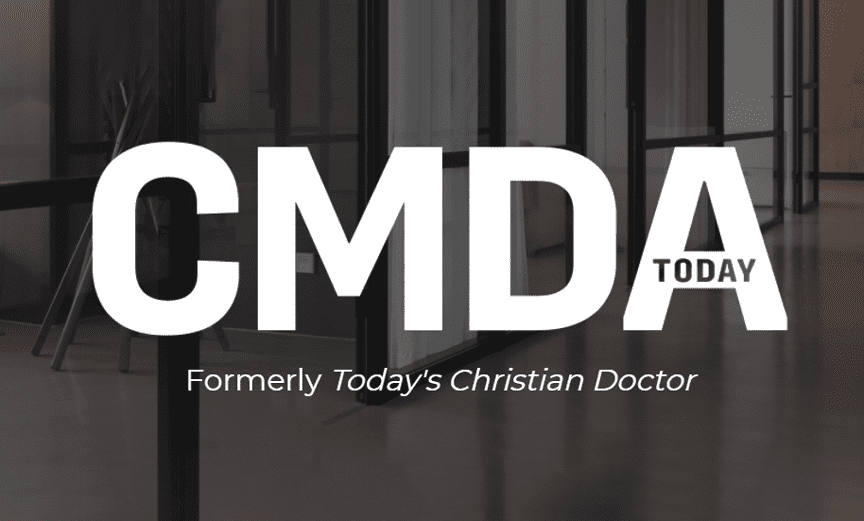
Faith Prescriptions: Just What the Doctor Ordered
Introducing a new video-based teaching program from CMDA to equip healthcare professionals to share the love of Christ with their patients and colleagues

William T. Griffin, DDS
Introducing a new video-based teaching program from CMDA
to equip healthcare professionals to share the love of Christ
with their patients and colleagues
How many Christian healthcare professionals entered into their training with the goal of utilizing healthcare as a means of communicating the love of Christ to their patients? I have only met a select few whose desire to become healthcare professionals was integrally tied to their desire to proclaim Christ through their treatment by seeking to preach and heal as Jesus did (Matthew 9:35)-either on the mission field or on the home front.
The more common scenario is that Christians go into healthcare because they want to “help people,” a desire that is somewhat vague and incompletely defined, with the assumption that the content of this desire will take shape somewhere along the journey. What a delight it can be to discover that our treatment of patients’ physical ailments can be such a powerful entrance into addressing their spiritual needs!
In keeping with its mission to educate, encourage and equip Christian healthcare professionals to glorify God, CMDA launched two tremendous training programs known as Saline Solution in 1995 and Grace Prescriptions in 2013. Developed by Drs. Walt Larimore, Bill Peel and Gene Rudd, this material was eagerly consumed and applied by thousands of Christian healthcare professionals across the country. The benefits of this program extended to both patients and clinicians, as patients received care that transcended their physical needs, while doctors discovered that their efforts to treat the whole person made their profession more fulfilling as they stepped into a fuller understanding of how the Lord could use them in their chosen profession.
Faith Prescriptions is CMDA’s latest effort to equip and inspire Christian healthcare professionals, and this video-based version of the curriculum builds upon the solid foundation of the prior programs, with some significant differences. First, the videos in this series are 15 minutes, a perfect length for discussion groups. Also, 20 healthcare professionals from 12 states and various ethnicities bring their expertise to the series. They treat patients in a variety of settings-private practices, hospitals, low-income clinics and the international mission field. Additionally, the series covers a broad spectrum of healthcare topics: addiction treatment, end-of-life care, ministering to the LGBTQ community, treating refugees and immigrants, dental treatment, academic medicine and more. The net result is a powerful launching pad for CMDA members to enjoy mutual inspiration and encouragement in applying the love of Christ to everyday patient care.
Faith Prescriptions is now available in the CMDA Learning Center, which CMDA members can access for free. The first 10 videos were made available in conjunction with the 2021 CMDA National Convention. These initial episodes include a number of topics of interest to all healthcare professionals, including taking a spiritual history, praying with patients, staying on schedule, keeping it natural, spiritual interventions, sharing the good news, etc. More videos are being added each month, with a total of 25 videos planned and currently in various stages of completion. Also available with the videos are a Participant’s Guide and Leader’s Guide, which include episode summaries, discussion questions and additional resources.
To whet your appetite for the inspiring content of this video series, consider the following excerpts from four episodes.
with Timothy Allen, MD, from Milwaukee, Wisconsin
“The Bible really gets people, and that’s one of the things I like to emphasize. When I talk to my patients who struggle with addiction, I’ll take them to Romans chapter 7, starting with verse 14, where Paul talks about, ‘Why is it that I do the things that I don’t want to do, and I don’t do the things that I do want to do, who will save me from this body of death?’ And when I bring that up to patients, they’re like, “Whoa, the Bible gets me, it understands addiction.” And it’s like, ‘Yeah, you’re in the Bible, so am I….'”
with Jennifer Kang, MD, from Redding, California
“My goal in interacting with my LGBTQ patients is to allow them to feel the truth of my heart toward them, which is that I don’t reject their pain experience. I see their pain experience, I validate it… I have not experienced the same pain, but I do know I have experienced rejection, I have experienced many of these things that are human, and I know what they feel like.”
“When we affirm a person’s pain, we are affirming that person, and not their beliefs or their conduct, or their behavior. If those things we judge so strongly that we cannot connect with somebody and see their value, then we’re always going to struggle, because we all fail, and we all are on a journey.”
with Omari Hodge, MD, from Braselton, Georgia
“Diversity will bring different groups of people around you who may not look like you and think like you and talk like you, but cross-cultural dependency will add another layer, a layer that says that I give authority to other people who don’t think and look like me, to speak into my life and I am relying on them, understanding that I have blind spots, that I am limited in the way I can see and do life.”
“Communicating the Gospel Internationally“
with Scott, MD, a missionary serving in the Middle East
“I found that in relationships in general, I as a foreigner who didn’t have the same rules of honor and shame in terms of how I related to people, became a safer person for people to reveal their struggles-struggles within the family, struggles within work, emotional struggles, spiritual struggles. I think it was in part because I opened up first and sort of revealed that even though I’m a doctor and a foreigner-and there was a certain degree of honor that was automatically given to me because of my position-I was also a human being in need of the grace of God, a person of weakness.”
with Kevin Aduddell, DDS, from Richardson, Texas
“In financial circles we are told to invest for the long-term, and that’s a wise thing. We know from our walk with Christ that we also need to invest for eternity. When we take small investments of time over the course of our careers, we will be able to look back at the end and know that those seeds of faithfulness have grown into a harvest that’s great. And we will be able to look at our career, and one day, God-willing, we will hear, ‘Well done, good and faithful servant.'”
So how can this series best be utilized to gain the most benefit for our members and their patients?
- Form a group. “As iron sharpens iron, so one person sharpens another” (Proverbs 27:17). The greatest benefit for viewers will be gained through participation with others. With each video being concise, the quantity of material presented is limited, but the potential applications to real-life patient situations is virtually unlimited. Group discussion, with the sample questions as a starting point, will move the topics from the theoretical to the practical, and the regularity of meetings will create built-in accountability to exercise what is learned and discussed.
- Limit discussion group size. If your group includes more than five or six members, consider watching the video together, then splitting into smaller groups for the discussion. This will facilitate greater involvement and ideally greater application of what is discussed.
- Watch the videos in advance. Each video, though limited in length, is jam-packed with thought-provoking applicable content. If participants view the videos prior to the group meetings, the subsequent group discussion will be more profound and beneficial.
- Invite colleagues. There are great potential advantages to having other healthcare professionals in your area exposed to this series. First, it will increase the spiritual IQ of your healthcare community, opening the doors for additional ministry opportunities, in which healthcare professionals can act synergistically to move a shared patient toward Christ. Secondly, having other local clinicians join together for training experience will serve as a visible reminder that we are not alone in our efforts to proclaim Christ through our patient interactions. Thirdly, studying this material with local colleagues will create the mutual encouragement that can inspire us to be more regularly involved in spiritual interventions.
To easily access this series in the CMDA Learning Center, visit www.cmda.org/learning. All episodes are free to CMDA members. The first episode is even available at no charge for non-CMDA members as a special preview. Our hope is that many CMDA members will spread the word, so that study groups will spring up across the nation. In this way, even the potentially devastating effects of disease can serve God’s purposes to grow faith in our patients and colleagues. May our great God receive the glory He alone deserves as we seek to be the hands and feet of Jesus in healthcare.
William T. Griffin, DDS, serves as the director of the Faith Prescriptions project. He has been a member of CMDA since dental school, and he now serves as CMDA’s Vice President of Dental Ministries. He also has served on the CMDA Dental Advisory Council since 2013. He is a 1983 graduate of Virginia Commonwealth University School of Dentistry, and he has been practicing in Newport News, Virginia for 35 years. Dr. Griffin formerly served as Board Chairman and Dental Director at the Lackey Clinic, a Christian medical-dental clinic in Yorktown, Virginia. He averages four international dental mission trips each year, and he is passionate about opportunities to communicate the love of Christ to others, both domestically and internationally. He and his wife Linda have been married since 1983, and they have been blessed with two married children and two grandchildren.










